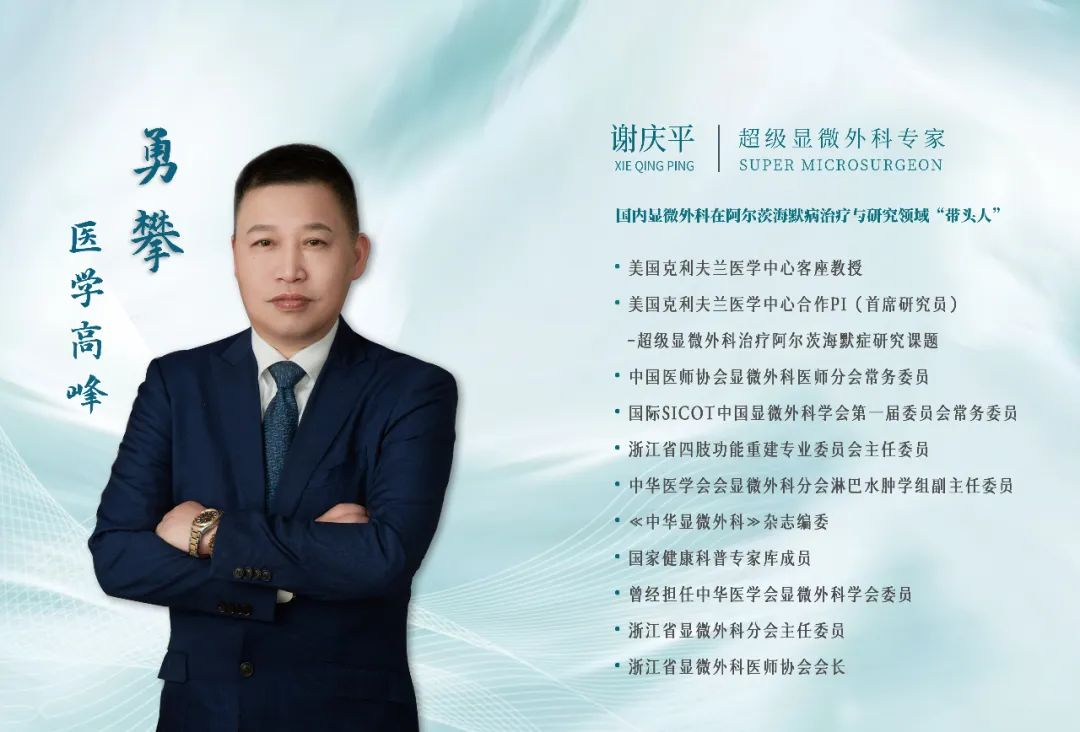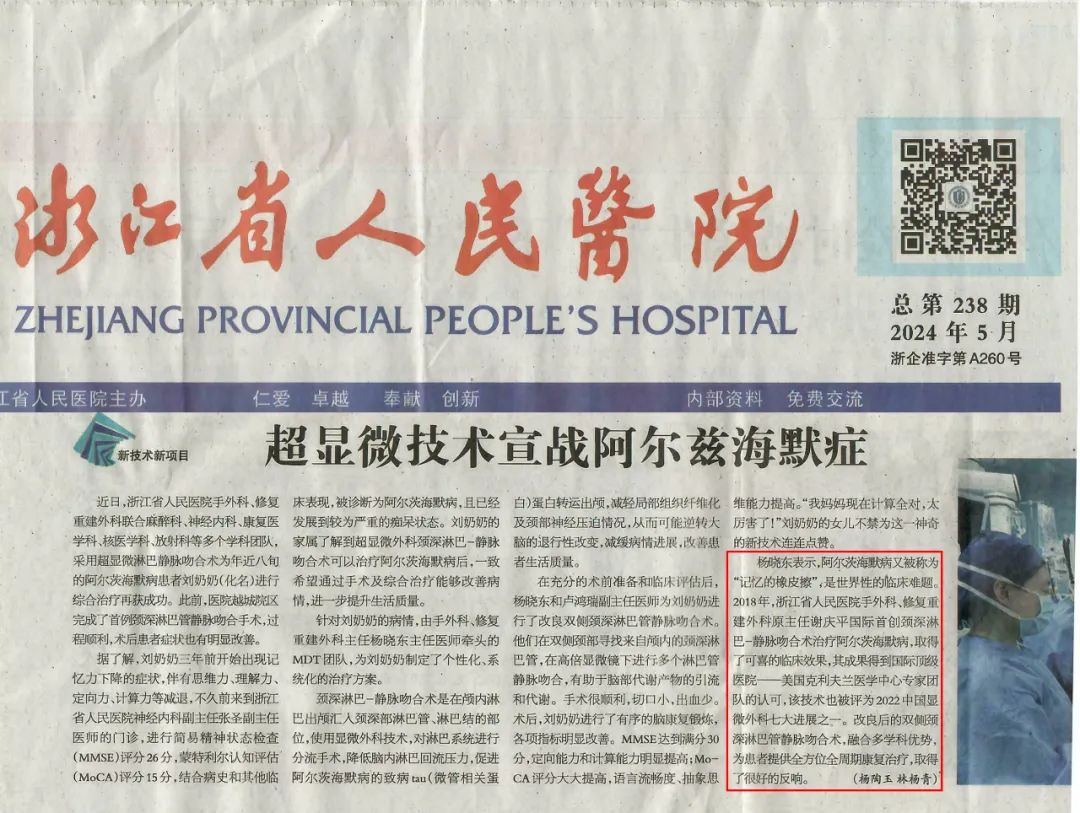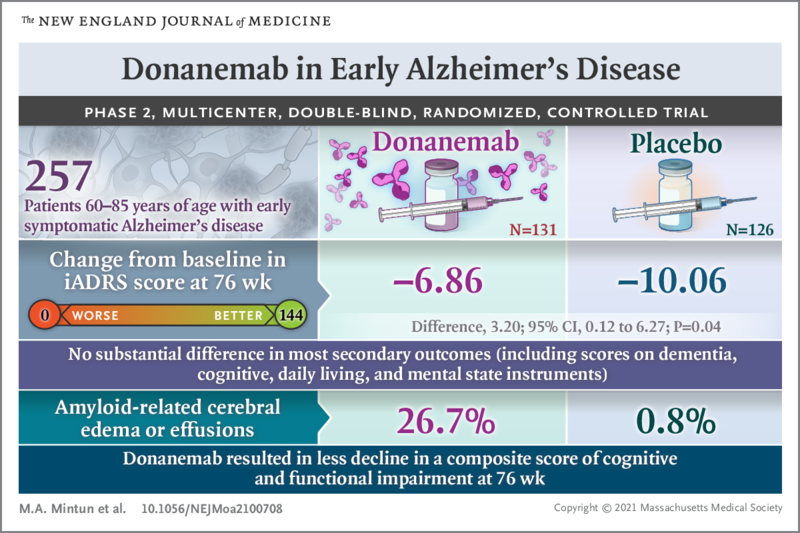Alzheimer's disease, also known as senile dementia, is often referred to as the "eraser of memories." According to statistics, there are currently about 9.83 million Alzheimer's patients in China, making it one of the most costly, deadly, and burdensome diseases in terms of caregiving. On June 1, 2024, the first symposium on the application of cervical LVA in the treatment of Alzheimer's disease was held in Hangzhou. Over 100 medical experts from around the world gathered to explore this new frontier in microsurgery—brain remodeling. This symposium brought hope and showcased Chinese expertise in addressing the global challenge of Alzheimer's disease with rapid, effective, and relatively inexpensive treatment methods. The event took place at Wset Lake Hillview Tourism International Hotel, where renowned international researchers and microsurgeons convened. Professor Xie Qingping, Director and Chief Physician of Hangzhou Qiushi Hospital, announced to the attending experts that his team had developed and verified the bilateral cervical deep lymphatic-venous anastomosis technique through over 300 clinical cases. This breakthrough brings new hope and highlights Chinese innovation in the global fight against Alzheimer's disease.
In 2018, Professor Xie Qingping and his team at Zhejiang Provincial People's Hospital performed the world's first cervical deep lymphatic-venous anastomosis surgery to treat Alzheimer's disease, achieving remarkable clinical results. This technique was recognized as one of the seven major advances in Chinese microsurgery in 2022. The enhanced bilateral cervical deep lymphatic-venous anastomosis, which leverages multidisciplinary strengths, provides comprehensive and continuous rehabilitation treatment for patients and has received positive feedback. In April 2023, as a visiting professor at the Cleveland Clinic in the United States, Professor Xie presented the preliminary results and clinical observations of this technique to Professor Wei F. Chen's plastic surgery team. During his visit, Professor Xie also had the honor of meeting Dr. Louveau, one of the authors of a groundbreaking discovery published in Nature. Dr. Louveau's research revealed the existence of a lymphatic system in the human brain, showing that the arachnoid membrane contains a series of lymphatic vessels that facilitate the clearance of central nervous system components and immune cells. Disruption of these vessels can influence the development of neurological diseases such as Alzheimer's disease and multiple sclerosis. This foundational research opens up the possibility of using lymphatic-venous anastomosis to treat Alzheimer's disease and other brain functional disorders.
At the symposium, Professor Xie Qingping presented a comprehensive overview of the bilateral cervical deep lymphatic-venous anastomosis technique developed by his team, which has been validated through over 300 clinical cases. He also performed a live surgical demonstration. During a press conference on the afternoon of June 1st, Professor Xie revealed to the media that two renowned lymphatic surgery experts, Professor JP Hong from Asan Medical Center in Korea and Professor Tobias Hirsch from the University of Münster in Germany, had observed his surgery in its entirety before the symposium. The presence of these internationally acclaimed experts highlights the global significance of exploring cervical LVA for treating Alzheimer's disease. “Currently, I can perform over 200 surgeries a year, but any more would be exhausting,” said Professor Xie. He expressed his hope that collaborative efforts from colleagues worldwide would amplify the impact of this technique. Follow-up studies on existing cases indicate that the surgery can partially alleviate, halt, or improve symptoms of brain functional disorders. The oldest patient in these follow-up cases is 92 years old, with the surgery proving particularly effective for those in the agitated phase of Alzheimer's disease.
The symposium gathered distinguished international researchers and microsurgeons from across the globe. Notable participants included Professor JP Hong from Asan Medical Center in Korea, Professors Tobias Hirsch and Maximilian Krause from the University of Münster in Germany, and prominent domestic experts such as Professors Hou Chunlin, Xu Yongqing, Zhao Dewei, Yao Zhibin, Luo Jianhong, Liu Xiaolin, Gu Liqiang, and Zhang Yixin. Industry leaders like Matt LeMay, Vice President of Asia-Pacific at MMI, a company focused on enhancing microsurgery precision with AI robotics, also attended. Participants freely exchanged insights on innovative techniques, particularly the use of lymphatic-venous anastomosis for treating brain diseases. The symposium highlighted the potential of brain remodeling, offering new hope to millions of Alzheimer's patients and their families worldwide.









